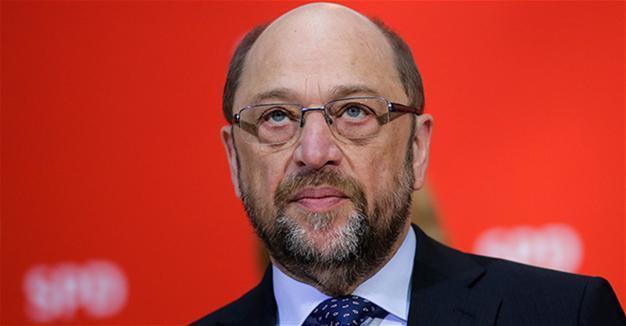Merkel cheers poll win as ‘Schulz effect’ fizzles

AP photo
German Chancellor Angela Merkel yesterday welcomed a surprise state poll triumph by her party as “encouraging” for a September general election, as hype around her main rival fizzled in its first test.With just six months to go until voters decide whether Merkel will have a fourth term, the election in the tiny southwestern state of Saarland Sunday took on outsized importance.
Voters returned Merkel’s conservative Christian Democrats (CDU) to power with 41 percent of the vote, five points higher than at the last election in 2012.
“Yesterday was a great day and thus an encouraging day,” she said, after presenting Saarland’s victorious CDU premier Annegret Kramp-Karrenbauer with a bouquet of daisies.
The center-left Social Democrats (SPD), who had been enjoying a surge in the polls thanks to their freshly-anointed standard bearer, Martin Schulz, came in a distant second with 30 percent.
Schulz, the former president of the European Parliament, admitted yesterday that the result had been a bitter disappointment just a week after SPD delegates unanimously elected him party chairman.
But he tried to put a brave face on the defeat.
“Election campaigns are marathons and not sprints, and we have good stamina,” he said, warning the CDU that “those who are celebrating today shouldn’t count their chickens before they hatch.”
Saarland is governed by a “grand coalition” government, the same right-left alliance that Merkel leads in Berlin.
For Schulz to take her job from her, he would likely need to win a majority for a leftist coalition with the far-left Die Linke and the ecologist Greens party known as Red-Red-Green.
Commentators said the Saarland result indicated voters may be getting cold feet about that prospect.
Germany’s top-selling daily Bild said Merkel clearly had the wind in her sails after the Saarland vote, noting the dilemma faced by Schulz and the SPD.
“It’s a small state, but a big signal,” it said of Saarland, the first of three German state polls scheduled in the run-up to the national election on Sept. 24.
“If Martin Schulz wants to become chancellor, he is going to have to put all his eggs in the Red-Red-Green basket -- a big risk.”
After weeks of breathless media coverage of the so-called “Schulz effect”, credited with lifting the SPD around 10 points in national polls to pull even with the CDU, news website Spiegel Online said the election proved he had “no magic powers.”
The center-left Sueddeutsche newspaper said the poll had been a crushing reality check for the SPD.
“While yesterday’s result hasn’t ended the SPD’s hopes of making it into the chancellery, it has certainly put a damper on Schulz mania,” it said.
Merkel predicted further poll disappointments for the SPD as it had failed to bridge its bitter and lasting gulf between centrists and leftists stemming from a program of labor market reforms known as Agenda 2010 that was passed by her SPD predecessor Gerhard Schröder.
“Being stuck in the past is not what people want,” she said.
















